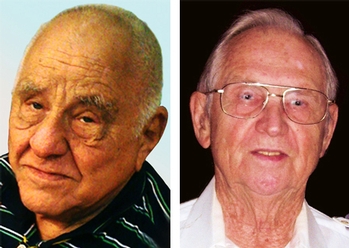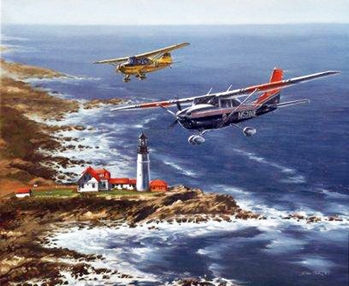-MONTGOMERY AL-When Civil Air Patrol marks its 70th anniversary with a ceremony at 11 a.m. Thursday at its National Headquarters building at Maxwell Air Force Base, Alabama, the organization will also be honoring two of its World War II members now in the Alabama Wing, Lt. Cols. Wendall Haas of Birmingham and Otha Vaughan of Huntsville, with the Exceptional Service Award.
Vaughan, 82, joined CAP as a cadet in the Anderson, S.C., squadron as a 15-year-old in 1944. Today he remains an active member of the Huntsville Senior Squadron, serving as the unit's historian and as assistant aerospace education officer.
Vaughan is also a CAP flight crew member, participating as a mission scanner during various search and rescue exercise missions.
During the war Haas, 88, served as an officer with what was then known as San Fernando Valley Squadron 9184 in California after joining in early 1942. He was an airplane and engine mechanic, helping repair aircraft as needed - including, he recalls, patching up planes shot up while towing kites for target practice by military pilots.

-Lt. Cols. Wendall Has (left) and Otha Vaughan to be honored at CAP 70th Anniversary event, CAP images-
One fellow squadron member Haas remembers particularly well was the popular film and, later, TV actor Robert Cummings, who flew as a CAP first lieutenant before serving as a pilot in the U.S. Army Air Force.
These volunteers were just two of the roughly 60,000 Americans who belonged to CAP during the war years. An effort is now under way to secure a Congressional Gold Medal in recognition of Haas as well as all other adult World War II CAP members for their outstanding and unusual public service.
CAP was established six days before Pearl Harbor and quickly became involved in combat operations off the Atlantic and Gulf Coast.
Within weeks of the U.S. involvement in the war, German submarines began sinking vital shipping within sight of Americans standing on the East Coast. Because the military lacked the necessary ships and aircraft to respond and the attacks were so numerous and successful, the entire early war effort was threatened. At the insistence of the oil industry, the military decided to use CAP's civilian assistance as a 90-day "experiment."
The "experiment" was extremely successful. For 18 months, CAP members flew 24 million miles in search of the enemy. After CAP repeatedly discovered submarines that got away, members' small personal aircraft were armed with bombs and depth charges. The combat operations were often flown in weather conditions that grounded the military.

-NHQ Lighthouse Image-
CAP was ultimately credited with sinking two submarines, attacking 57 and reporting 173 to the military. After the war, when asked what he considered the most significant factor in the German forces' defeat off the Atlantic Coast, one former U-boat commander cited the CAP members' efforts: 'It was because of those damned little red and yellow (CAP) planes!"
This is only part of the story of CAP's wartime service. It quickly established itself as a vital resource to the military as well as communities across the nation; its missions included search and rescue, border patrol, forest fire patrol, target towing, courier/cargo flights and other essential tasks. These critical missions supported the war effort and freed up military personnel needed elsewhere. By war's end CAP had flown more than 750,000 hours. Sixty-four CAP members lost their lives during the war in service to their country.
CAP established itself as a vital wartime service to communities. Its record included 20,500 missions involving target towing (with live ammunition) and gun and searchlight tracking. It also involved a courier service, carrying more than 3.5 million pounds of vital cargo and 543 passengers, and southern border operations flying more than 30,000 hours, with 7,000 reports of unusual sightings including a vehicle (which was apprehended) with two enemy agents attempting to enter the country.
Since the war, CAP has become a valuable nonprofit, public service organization chartered by Congress. It is the auxiliary of the Air Force, charged with providing essential emergency, operational and public services to communities, states, the federal government and the military. -FMI: CAP